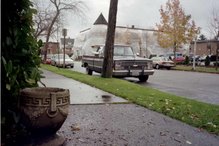 |
| Reading Accelerator |
Before
all the cell phones on the bus, I carried three by five notecards with a thick
rubber band. Right now I have used cards
I made during the inventory of books from my parents' house in the late 1980s,
the list included children's books that were mine. The Jack and Jill Round the
Year Book, I entered onto the internet, and found the illustrator also did the
Gone-Away Lake books by Elizabeth Enright, the Borrowers, and Miracles on Maple
Hill.
Junior
High School resources of my own brought books into the house. Downtown was Rhodes' book department on the
other side of the escalator wall. I
still have A Tale of Two Cities, and others with a similar cloth hardback
format. Downtown also was the Tacoma Art
Museum, at an historic building near the Fawcett monument, where I visited once
or twice, and i visited Fox Books. I
still have Memoires D'un Lapin Blanc, in its gold and red old-fashioned
hardback. We took French, the language
of visual art.
I
got books in the mail from a book club.
I think I ordered The Jack and Jill Round the Year Book from the
club. Miracles on Maple Hill, is a book
with its history with me, that I believed it sounded boring. Miracles on Maple Hill would have beamed out
associations I would find painful and a grave misunderstanding of what went on
for me while the teachers of our class called Developmental Reading kept pushing
it hard. Developmental Reading included
a gadget for each student. It was
somehow easy to turn the pages, even
though a metal bar descended slowly or quickly, calibrated to measure, direct,
and increase our reading per second.
None of us could ever have
thought of books that way before.
So
it was only very recently that I read through Miracles on Maple Hill - quickly – the gadget alive in my
recollection. The author remade the
gentle model that the family moves out to the country; the children and mom,
who drives, commute, father recuperates, a returned Missing in Action prisoner
from the war in Korea. So in its
realism, it also develops maple sugaring in Pennsylvania by an elderly neighbor
who sometimes forgets. It certainly
deserved the Newbery Award.
What
made me avoid Miracles on Maple Hill?
Maybe subconsciously I knew maples were really all wrong. I knew a hill of my own, alders and some
evergreens, with lots of ferns and horsetails. (Now that woods is gone.)
At
that age, two years since the school had wanted me to skip fifth grade and had
to bring a sixth grade desk in to the fifth grade schoolroom because I was too
fat to fit the smaller desks, visits to my grandmother every Wednesday and
every Sunday afternoon had never varied.
The house had entered its elderly affliction gradually. The house was not a house, but a home fitted
up in inexpensive ways for the elderly.
A lot of the time my mother had to choose.
One
Christmas my mother gave me The Shirley Temple series, the entire set of the
classic stories that were adapted for the Shirley Temple movies. I was a little
old for these and accepted them with a slight stoicism, for I had never been a
child star like beautiful Shirley Temple.
Some visits, when the weather was bad or it was dark, a Shirley Temple
movie had appeared on my grandmother's tv set. We watched our way through the
many commercials, but had never seen these as they had appeared on the big
screen. My mother gave these not exactly
to me, she had an opportunity to buy them, and it was not possible for her not
to want them. Even as my acceptance was
stoic, it was not possible for me not to associate the gift with the many
visits to my grandma.
Having
all the books at once was not like our family.
But I was too old for the books to be given to me year by year.
(The
source of the illustration that shows a reading accelerator is listed as The Blackwell
History of Education Museum at Northern Illinois University.)
 "Laura had read in Arthur Ransome you had to tack to sail upwind, you tacked from one side of the lake to the other to sail against the wind." In an essay about childhood reading published at Salt River Review, I remembered Arthur Ransome.
"Laura had read in Arthur Ransome you had to tack to sail upwind, you tacked from one side of the lake to the other to sail against the wind." In an essay about childhood reading published at Salt River Review, I remembered Arthur Ransome. 



























